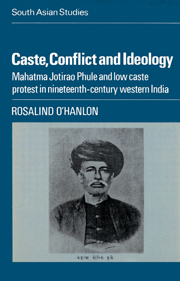 Caste, Conflict and Ideology
Caste, Conflict and Ideology Book contents
- Frontmatter
- Contents
- Acknowledgements
- Notes on translations and area under study, with map
- Part 1 Introduction
- Part 2 Religion and society under early British rule
- Part 3 Jotirao Phule and his circle: the emergence of a distinctive radical voice
- Part 4 The creation of a lower caste identity in history and popular culture, 1869–73
- Part 5 The lower caste community in contemporary society
- 11 Religious emancipation and political competition
- 12 Social protest and the construction of a religious ethic
- 13 Traditional privileges and new skills: Phule's analysis of the nature of Brahman power
- 14 The Satyashodhak Samaj in the 1870s
- Part 6 Ideology and the non-Brahman movement in the 1880s
- Bibliographic note
- Bibliography
- Glossary
- Index
12 - Social protest and the construction of a religious ethic
from Part 5 - The lower caste community in contemporary society
Published online by Cambridge University Press: 14 October 2009
- Frontmatter
- Contents
- Acknowledgements
- Notes on translations and area under study, with map
- Part 1 Introduction
- Part 2 Religion and society under early British rule
- Part 3 Jotirao Phule and his circle: the emergence of a distinctive radical voice
- Part 4 The creation of a lower caste identity in history and popular culture, 1869–73
- Part 5 The lower caste community in contemporary society
- 11 Religious emancipation and political competition
- 12 Social protest and the construction of a religious ethic
- 13 Traditional privileges and new skills: Phule's analysis of the nature of Brahman power
- 14 The Satyashodhak Samaj in the 1870s
- Part 6 Ideology and the non-Brahman movement in the 1880s
- Bibliographic note
- Bibliography
- Glossary
- Index
Summary
The idea of human rights
Compared with the ideas that had developed within the European Christian tradition, none of the theologies of pre-nineteenth-century Hinduism contained a strong concept of an original human equality. In Christian thought, both catholic and protestant, this equality was a reflection of all men's origins at the hands of their Maker. This absence of any idea of a ‘natural’ order amongst men, in contrast with the humanly contrived order of society, meant that the speculative traditions of Hindu philosophy did not produce a movement of ‘rationalist’ social criticism. Such a movement did develop within the intellectual traditions of Europe from the seventeenth century. Central to it was the notion of ‘human rights’, based on the abstract idea of natural law.
Moreover, the tendency to devalue this-worldly life, together with the karmic doctrine that the structure of present society represented the final realisation of religious justice, had a profound effect on the Hindu individual's attitude to his own society. He could not look upon it as an arena for the realisation of social values, such as human equality, whose source was an extra-worldly God. The individual's activity should, rather, take the form of a search for release from all worldly existence.
Phule set out ways in which these attitudes and values might be superseded. The uncompromising claim of a pre-social human equality, deriving from the purposes of an extra-worldly Creator, stood at the centre of his scheme.
- Type
- Chapter
- Information
- Caste, Conflict and IdeologyMahatma Jotirao Phule and Low Caste Protest in Nineteenth-Century Western India, pp. 193 - 205Publisher: Cambridge University PressPrint publication year: 1985
